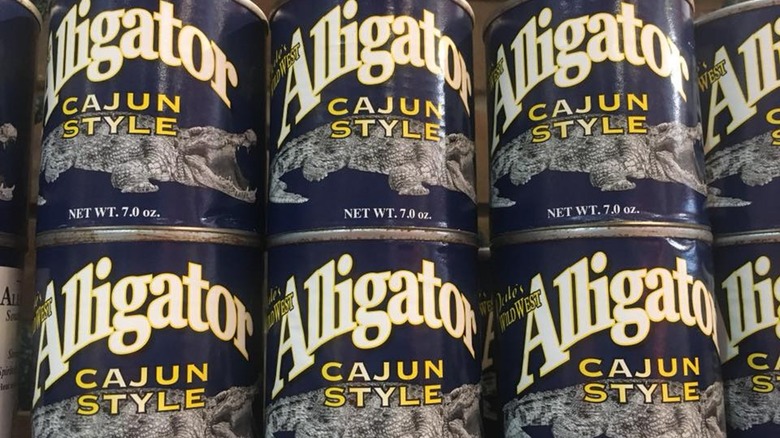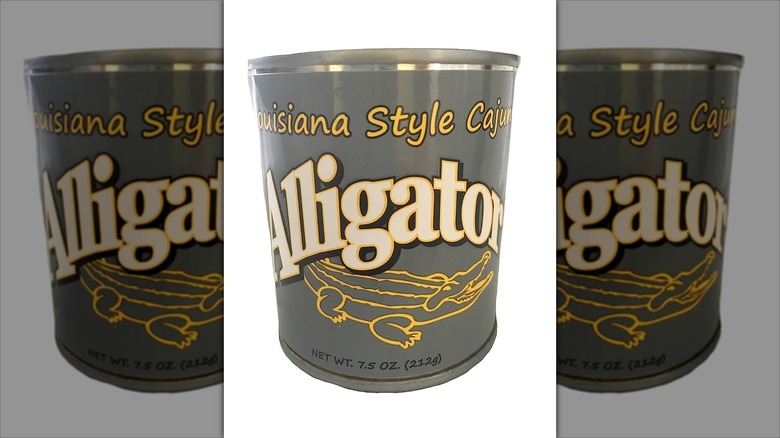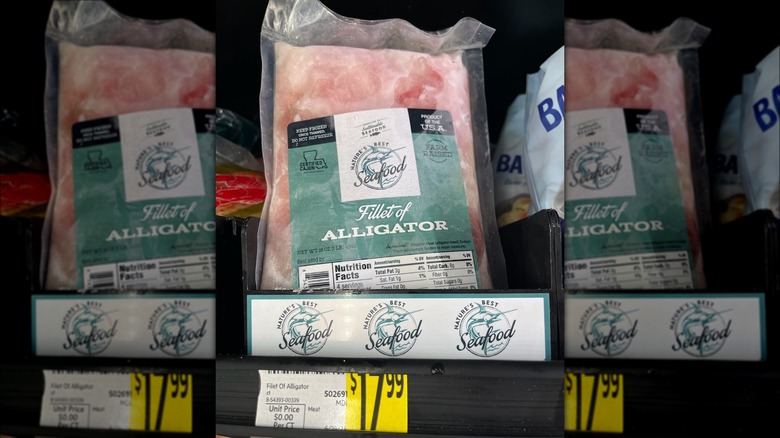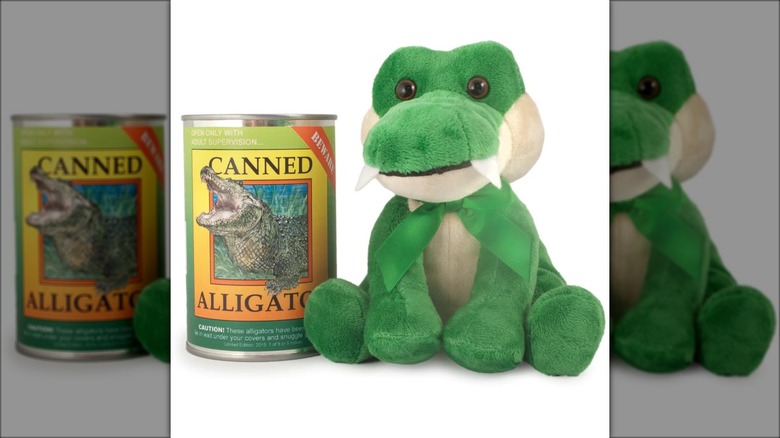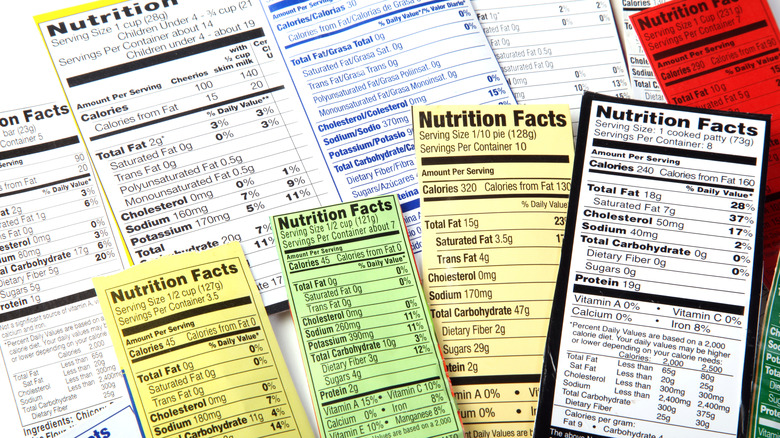Canned Alligator Meat Exists – Here's What To Do With It
We may receive a commission on purchases made from links.
Despite its being used as a prop in several humorous YouTube videos about people reacting to so-called "weird canned meats" or participating in a "try to eat" challenge, canned alligator meat is no joke. Alligator meat may be considered exotic meat in the sense that it is something not sold in every supermarket or featured on every restaurant menu, still, alligator dishes are not uncommon at Cajun restaurants and the alligator farming industry ensures a steady supply of gator meat even without any "Swamp People"-type antics.
If you'd like to try this regional specialty and you're touring the Atchafalaya Basin, you may have a chance to taste it snappin' fresh at any establishment with a name like Big Bastien's Cocodrie Cafe and Gator Wrasslin' Emporium. If you're located somewhere like the generally gator-free Rocky Mountain West, it's more likely you'll find it in frozen form at a restaurant chain such as The Lost Cajun. With canned alligator, though, you can try this meat any time in your own kitchen since this shelf-stable pantry item allows you to prepare your gator now or later.
What is canned alligator?
Apart from the fact that canned alligator meat is meat from an alligator that has been preserved via the canning process and is sold in a metal can, we, unfortunately, have very little information about the stuff. In all of our diligent research, we've only been unable to unearth what appears to be two brands, one made by the Newport Jerky Company and the other by a company called Dale's Wild West.
Both of these brands are billed as "Cajun-style," which implies that additional spices and seasonings are included in that can along with the alligator meat itself. One blurry photo of the back label of a Dale's can confirm this, although the ingredients list is pretty tough to read. The label, however, clearly states that the meat has been "simmered in a spirited Cajun gravy." The ingredient list from what appears to be the Newport Jerky Company brand, which also comes with its own "spirited" (though apparently not spiritous) gravy, includes alligator meat along with flour, salt, spices and flavorings, water, and a preservative called tricalcium phosphate.
What we can't say for sure is whether the canned gator comes from the tail of the beast nor from the body or the legs. In fact, we don't even know whether it is white or red, although alligator meat apparently comes in both varieties
How does canned alligator differ from frozen?
If you buy canned alligator meat, Amazon reviews indicate that you're going to get a fairly small can full of meat chunks (which do, in fact, look more red than white) swimming in a Cajun-spiced sauce. One person, in fact, referred to the purchase as "alligator-flavored gravy," which indicates that the bits of meat are possibly less than bite-sized. Some found the texture to be rather chewy, too, which is in line with the fact that the canning process can lead to meat losing some of its moisture and toughening up to an extent.
Should you purchase alligator in frozen form, the texture is likely to be far closer to that of fresh — in fact, the USDA permits meat that never drops below 0 F to be sold as fresh, so there's a chance that much of the meat we purchase from the supermarket may have been frozen at some point. Frozen alligator meat available for purchase also includes an ample choice of parts and pieces, some of them quite substantial. You can buy gator ribs, which are said to be great for grilling and smoking, while gator burgers, sausage, nuggets, legs, and tenderloin from the tail are also available. If you want to throw a gator barbecue and invite a whole crew of would-be Andrew Zimmerns, you can even purchase an entire cryogenic croc (which, okay, is not technically a crocodile, but we couldn't resist the chance to be gator alliterators).
What does canned alligator taste like?
With alligator meat in general, it seems the cliché about it tasting like chicken is pretty much true. In fact, Florida chef Kenny Gilbert, a former "Top Chef" contestant, tells Food and Wine that he thinks the flavor is a cross between chicken and grouper, while F&W itself opines that the chicken is of the dark meat variety. As for canned alligator, we again turn to online reviews as well as taking a closer look at the aforementioned YouTube videos.
The consensus among Amazon reviewers seemed to be that canned alligator is chickeny and flavorful (the latter thanks, in no small part, to the Cajun gravy). A YouTube panel of Irish taste testers was divided, with some liking the stuff but at least one adamant in their loathing. For the most part, they found it to be on the chewy side but with plenty of punch from that spicy sauce. The YouTube food challengers, too, found canned gator meat to be quite enjoyable, which came as a surprise to many of them. They were eating the Dale's Wild West brand, with one panel member remarking that the Cajun seasoning was "really good." Another panel member compared the flavor and texture of the meat itself to a cross between chicken and jerky.
How to cook with canned alligator
While fresh or frozen alligator meat can be baked, pan-fried, or grilled, canned gator meat lends itself to a far more limited range of options. You can eat this pre-cooked product straight out of the can as the taste testers did in the videos, or you could also heat it up and use it to top a bowlful of rice as its ad copy suggests,
People who purchased canned alligator from Mountain America Jerky had a few ideas of their own regarding how best to prepare this product. One person said they liked to warm it and have it on toast and also said it can be used to make a pretty great chili. Someone else suggested frying it with peppers and onions, while most purchasers agreed with the idea of just pouring it over rice. It might be good mixed with scrambled eggs, as well, or perhaps used to make a toothsome topping for a baked potato or pasta. One person even suggested the perfect beverage pairing: Gatorade, of course.
Where to buy canned alligator
If you're in the market for canned gator, we have some bad news for you. All of the third-party retailers we've been able to find for the product are listing it as out of stock at present. We won't append a complete list of these, since why bore and frustrate you with information about where you won't be able to obtain it? The Newport Jerky Company, in fact, no longer lists canned alligator on its website at all, although it does still sell gator jerky as well as taxidermied gator heads in case you're in need of holiday gift ideas. As for Dale's Wild West, the company seems not to have a website, so it's possible that this small-scale operation only sells its products wholesale.
Canned alligator may still be available in actual stores in gator-rich states like Louisiana and Florida. The Gypsy Nesters travel blog posted about it as a "weird regional food" and, as the blog revolves around RV dwellers with no fixed abode, it seems likely that it was purchased (or at least photographed) at a brick-and-mortar retailer. A Facebook user, too, seems to have spotted the Dale's Wild West brand at a New Orleans grocer back in 2018. Even if you can't buy canned gator meat online just now though, there is one type of non-edible alligator that does come in a can and is readily available: a stuffed toy that pops out when you open the lid.
Nutritional information about canned alligator
Little nutritional data is available about canned alligator in particular, but alligator, in general, is pretty high in protein, with 46 grams of the stuff per 3.2-ounce serving (which, to be honest, is probably more meat than you'll get in a 7.5-ounce can, if those Amazon reviews are anything to go by). It also has 232 calories for a same-sized portion, which is slightly higher than the 219 calories you'll find in 3.2 ounces of sirloin steak. Gator is lower in fat, though, with just 4 grams as opposed to the 10.5 grams in steak.
Canned alligator, however, is a somewhat different story since here you're dealing with the ingredients from the gravy as well as added salt boosting the sodium content. There's also the fact that the sterilization process that canned meat undergoes has a tendency to lower its nutritional value to some extent. Most canned meat products, however, are still seen as a good source of convenient, easy-to-eat, shelf-stable protein and there's no reason to assume that the meat portion in a can of alligator will be any different. While canned alligator may be scarcer than crocodile tears these days, if you do come across this product, you might as well pick up a few cans to stock your doomsday bunker so you can take a bite out of any pending apocalypse.
